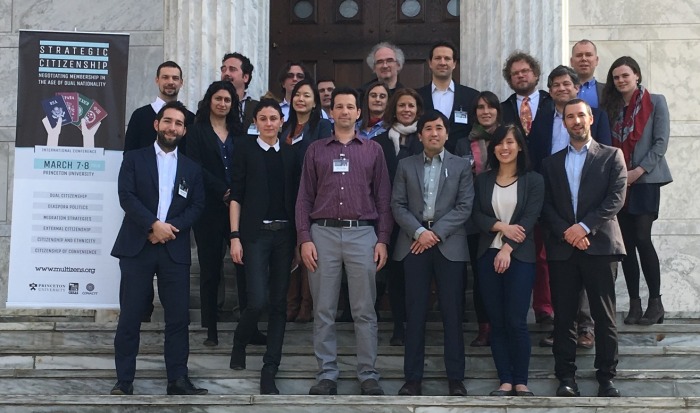On March 7-8 2016, a group of 23 leading scholars from all over the world gathered in Princeton University (NJ) to discuss the latest research on new uses of citizenship as a strategic global resource.

The conference was organized by Pablo Mateos (CIESAS, Mexico) and Yossi Harpaz (Princeton, US), motivated by a perceived research gap in social sciences and legal studies in migration and citizenship. This gap unfolds as follows:
Over the past two decades, there has been a worldwide legitimization of new forms of nation-state membership that challenge traditional conceptions of citizenship premised on the exclusive loyalty and residence. These are, above all, multiple citizenship and non-resident (or external) citizenship.
This legal reconfiguration has created new opportunities for individuals and families to strategize their national membership/s, decoupling citizenship and residence, legal status and identity. A series of pragmatic citizenship strategies have emerged at the individual and family levels, aimed at securing additional rights, especially mobility, security and access to economic opportunities. These developments are reopening questions about the meaning of national identity within citizenship and the future of national membership within a stratified global system.
New research has begun to emerge which seeks to understand these transformations from a “bottom-up” empirical approach that provides a crucial complement to the “top-down”, state-focused approaches that traditionally dominated the study of citizenship. This conference brought together 23 researchers (17 speakers and six discussants) doing cutting-edge work about the new frontiers of national membership from these perspectives. The conference sought to fill this lacuna by bringing together comparative, theoretically-informed and interdisciplinary research that explores the new overlapping boundaries of citizenship from bottom-up perspectives. An emerging theme running across all papers in the conference was the instrumentalisation of citizenship through individuals’ strategic practices, and the resulting consequences for inequalities and global stratification.
Participants presented 17 papers representing a range of disciplines – sociology, law, demography, geography and political science – and a broad geographic scope, integrating empirical material from Central and Eastern Europe, Latin America, North America and East Asia.
More information:
Funding
This conference has been possible thanks to the generous financial support from the following institutions in Mexico and the United States:
– Mexican National Council for Science and Technology (CONACYT), Mexico – Grant Nr. 214542
– Center for Research and Advanced Studies in Social Anthropology (CIESAS), Guadalajara, Mexico
– Department of Sociology, Princeton University
– Princeton Institute for International and Regional Studies (PIIRS), Princeton University
– Center for Migration and Development (CMD), Princeton University
